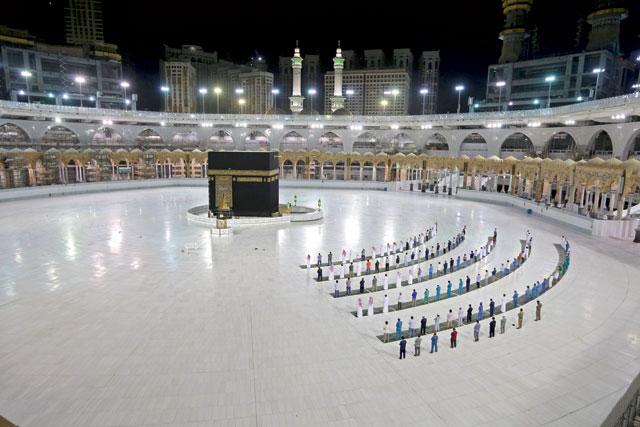- International News
- Web-2020-06-24 | 06:17 pm

With cases topping nine million worldwide, the World Health Organisation (WHO) warned that the pandemic was accelerating and new economic figures have underscored the scale of the carnage unleashed on global trade and industry.
The virus has also infected another high profile figure, after world number one tennis player Novak Djokovic of Serbia said he had tested positive for COVID-19.
Although a vaccine is still far away, South Africa is rolling out a trial of a drug this week — the first on the continent.
Europe has been steadily easing lockdowns and travel restrictions, but many parts of the world, including Latin America and South Asia, are only beginning to feel the full force of the pandemic, while other regions are being hit with second waves.
Saudi Arabia, which is suffering from the biggest virus outbreak in the energy-rich Gulf, announced it will allow just 1,000 pilgrims living in the kingdom to perform the Hajj — a fraction of the 2.5 million from around the world who attended last year.
"I’ve been preparing for years. But what can I do? This is Allah’s will — it’s destiny,” said Kamariah Yahya, 68, from Indonesia.
Spotlight on abattoirs
And in Germany, the authorities ordered a new lockdown for an entire district — the first since easing coronavirus restrictions and a major setback to hopes of a swift return to normality.
The new restrictions cover 360,000 people in the district of Guetersloh in Germany’s most populous state of North Rhine-Westphalia and follow a coronavirus outbreak in a slaughterhouse that has infected more than 1,500 workers.
Several COVID-19 outbreaks at abattoirs, not just in Germany but also in France, have put a spotlight on the working and housing conditions facing the workers — many of whom come from Romania or Bulgaria.
The disease and the punishing lockdowns introduced to try to curb its spread have caused economic havoc across the globe, and made millions of people jobless.
Outlook ‘highly uncertain’
The extent of the damage was highlighted Tuesday with the release of a World Trade Organisation (WTO) forecast that global trade was expected to drop around 18.5 per cent in the second quarter.
Outgoing WTO Director General Roberto Azevedo said the slide would be the steepest on record, but that it could have been much worse.
The WTO nevertheless cautioned that the outlook for the global economy over the next two years remained "highly uncertain”.
Auto sales in Europe this year will also tumble a record 25 per cent because of the pandemic which has left manufacturers facing a "major economic crisis”, the European Automobile Manufacturers’ Association (ACEA) said.
‘Lack of global solidarity’
On Monday, the WHO’s Director General Tedros Adhanom Ghebreyesus told a virtual health forum organised in the United Arab Emirates that "the pandemic is still accelerating”.
Tedros said the greatest threat was not the virus itself, which has now killed over 470,000 people, but "the lack of global solidarity and global leadership”.
"We cannot defeat this pandemic with a divided world,” he said. "The politicisation of the pandemic has exacerbated it.”
In the absence of a vaccine, the WHO has called for a rapid increase in production of the steroid dexamethasone, which has been shown to have life-saving potential.
However trials of a vaccine known as ChAdOx1 nCoV19 developed by the Oxford Jenner Institute are due to start in South Africa.
The drug is already being evaluated in Britain, and another pilot scheme is due to take place in Brazil.
In the United States, President Donald Trump said on Monday the country’s toll could surpass 150,000, as eight members of his team that helped organise a controversial weekend rally for him in Oklahoma tested positive.
The United States already has the biggest number of deaths at more than 120,400 fatalities.
In Europe, countries continued to ease restrictions.
Pubs, restaurants, hotels and hairdressers in England will reopen from July 4, Prime Minister Boris Johnson announced on Tuesday.
And in Paris, one of the city’s most visited museums, the Musee D’orsay, opened its doors again while swimming pools and cinemas have also opened up.
But illustrating the persisting risks, Portugal and Australia were among the countries tightening their restrictions.
China, Germany, South Korea and Japan are also battling new outbreaks, with some reintroducing containment measures.
The sports world has been slowly reemerging from the virus darkness, with Premier League matches on again in Britain.
But Djokovic’s announcement that he tested positive has raised questions about the planned return of tennis in August.
He joins a slew of other infected players who recently gathered for an exhibition tournament he organised in the Balkans, in the face of criticism from some other players.













